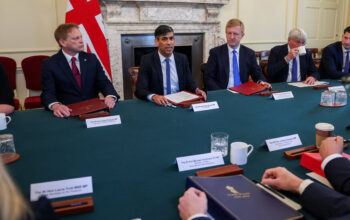
Pointing to the “new normal” of Europe in the face of Russian military provocations, the secretary-general of NATO said on Wednesday the alliance was drawing up plans for new combat units in central and southeastern Europe, while Britain said it was doubling the size of its NATO deployment in Estonia.
“We do not know what will happen in Ukraine,” the secretary-general, Jens Stoltenberg, said. “But the situation has already demonstrated that we face a crisis in European security. Moscow has made it clear that it is prepared to contest the fundamental principles that have underpinned our security for decades, and to do so by using force. I regret to say that this is the new normal in Europe.’’
NATO defense ministers directed the military commanders to make plans for new combat units to step up the military alliance’s presence in member nations near Russia, Belarus and Ukraine, Mr. Stoltenberg said.
The ministers “decided to develop options to further strengthen NATO’s deterrence and defense, including to consider establishing new NATO battle groups in central and eastern and southeastern Europe,” Mr. Stoltenberg said at a news conference.
The small battle groups could be set up in Romania, Bulgaria, Hungary and Slovakia, adding to those already established on a rotating basis in Poland and the three Baltic nations after Russia annexed Crimea in 2014.
France has already offered to create a multinational battle group in Romania, which has expressed interest in hosting one, Mr. Stoltenberg said.
Separately, Britain said on Wednesday it would send additional equipment, including tanks and armored fighting vehicles, to Estonia. Britain is already the lead country in the multinational battalion there, with about 900 troops.
“Alongside our NATO allies, we are deploying troops and assets on land, sea and air to bolster European defenses in response to the buildup of Russian military forces on the border of Ukraine,” the British defense secretary, Ben Wallace, said in a statement.
A battle group, including armored vehicles and personnel, will leave bases in Germany and Britain and begin to arrive in Estonia during the coming week, the statement said. It also said Apache helicopters would soon be making their way to conduct exercises with partners in Eastern Europe.


